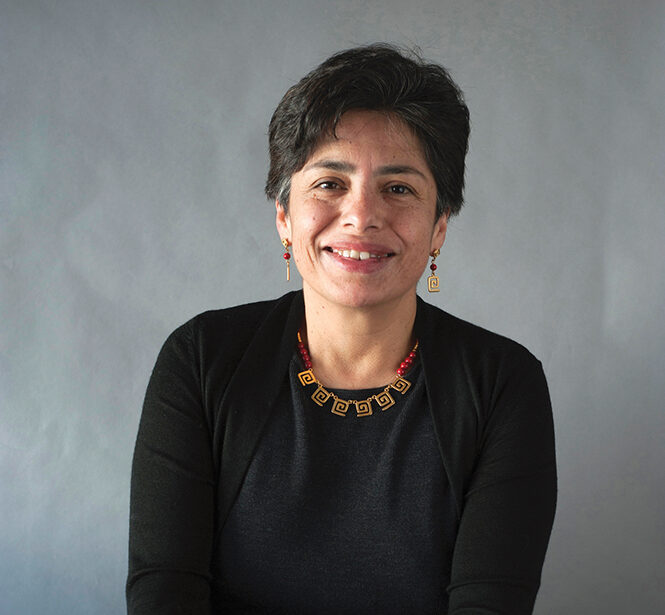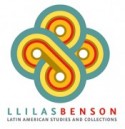Dr. Adela Pineda Franco — First Latin American Woman to Lead LLILAS
ADELA PINEDA FRANCO, a scholar in the humanities, joins the Teresa Lozano Long Institute of Latin American Studies as its new director beginning fall 2021. Dr. Pineda Franco comes to The University of Texas at Austin from Boston University, where she was a professor in the Department of Romance Languages and director of Latin American Studies at BU’s Frederick S. Pardee School of Global Studies. She also joins the faculty of the UT Department of Spanish and Portuguese.
Pineda Franco’s arrival at LLILAS represents the start of a new chapter in her academic life, as well as a return to a place of significance. She earned her master’s and doctoral degrees from UT Austin, the former in Latin American Studies from LLILAS and the latter in Comparative Literature. As the first Latin American woman to lead the institute, she takes the reins at a pivotal moment: after a brief reprieve, the U.S. continues to face uncertainty in the COVID-19 pandemic, along with much of the rest of the world, including Latin America. Via Zoom and e-mail, Pineda Franco talked about some of the challenges and opportunities of her new position, as well as her vision for the future of Latin American Studies.
Dr. Pineda Franco began our conversation discussing what she perceived as the biggest challenges in Latin American Studies. What stood out was her belief that in part due to globalization, Latin America represents the convergence of multiple, ever-changing realities that make their presence felt throughout the world. Nevertheless, while globalization has brought Latin Americans from all walks of life to every corner of the globe, it also brings a certain precarity to the future of Latin American Studies as an academic area. In response, Pineda Franco turns this notion on its head. Now more than ever, this interdisciplinary field affords students and scholars an array of critical lenses through which learning, teaching, research, and activism can take place. LLILAS Benson epitomizes the horizontal, twenty-first-century approach to learning from Latin America and Latin Americans—an approach that is full of promise and possibility. (The following excerpts have been edited and condensed.)
— Susanna Sharpe
The Role of Latin American Studies in a Multipolar World
Latin America cannot be regarded exclusively in terms of a cartographic demarcation. It is also a social and cognitive construct, rooted in daily practice; an incessant process of becoming, entangled in geopolitical and economic uncertainty; the habitat of radically divergent communities; a lively organism defined by political contestation and social struggle. At its core lies a permanent effort to democratize knowledge and society. Latin America has also been the ground of fertile ideas; meaningful art and literature; and a powerful lens to see the world otherwise.

It is not surprising that, today, the interdisciplinary field of Latin American Studies engages with a range of scholarly paradigms in order to illuminate the role of the global south in decolonizing our ideas of science, history, progress, globalization, and democracy. Tracing the circulation of political projects, social movements, and intellectual pursuits between countries and continents; reassessing the myriad indigenous responses to the global logic of neoliberalism; and celebrating the worldwide repercussions of Latin American art and literature, particularly the exorbitant success of female writers in the contemporary global arena, cannot but affirm the vital role of Latin American Studies as a hub of interdisciplinary collective efforts to bridge epistemological paradigms in advancing the social good in and beyond the region.
In a multipolar world system that demands cross-regional perspectives, Latin American Studies should not only study the region’s complexities and transnational impact, but should also become a fundamental vantage point to tackle the challenges of globalization.
COVID-19 has brought awareness to the urgent need to think globally without neglecting regional concerns. The pandemic has also taught us that academia cannot be isolated from civic life. This is exactly what LLILAS Benson has pursued throughout the years. Through its multiple public arenas, including the annual Lozano Long Conference, the Foro Urgente, and the curated exhibitions at the Benson Collection, LLILAS Benson provides Latin American perspectives on contemporary global challenges. The idea that LLILAS is not only preserving knowledge but is actively engaged in social change and historical movement is of great interest to me and something I will continue to work on.
Texas, the Gateway to Latin America
The Teresa Lozano Long Institute of Latin American Studies and the Nettie Lee Benson Collection irrigate not only the entire UT system, but also myriad organizations and communities in and beyond the U.S. and Latin America. Texas itself is of paramount importance for Latin America. I think of the Texas–Mexico border as an emblem of the world today. It envisions measures of biopolitical control, but it’s also one of the most fluid regions in the world. It is a place where art is coming to fruition in relationship with social justice. The importance of the border is such that an institute located in Texas should address not only U.S.–Mexico relations, but should exist as a paradigm of Latin American relations with the United States. I aim to continue generating multipolar perspectives on the study of Latin America. For me, this is the most important aspect of Latin American Studies today.
This brings me to the Benson. I cherish the Benson. It was my home during my years as a graduate student. The Benson and the institute have a synergy. They nurture each other. And for me, the Benson is an exemplary library, as a horizontal knowledge provider that is engaging with Latin American libraries and archives. This is very exciting because the Benson is also bringing other libraries (archives) in Latin America to Texas and vice versa. So if the U.S.–Mexico border is compromised by controls, I think the Benson has opened up the borders between Latin America and the United States, and this is really something that I would try to enhance.
LLILAS Benson is crucial to UT Austin in the university’s new status as a Hispanic-serving institution. UT is a world-class public university, situated in the heart of Texas, in close proximity to the U.S.–Mexico border, and thus unavoidably connected with the pulse of Latin American history, U.S.–Latin America relations, and the legacies and accomplishments of the Hispanic/Latino population in the United States. As director of LLILAS, I aim to promote scholarly and public programs that engage the UT community with the history and culture of the Hispanic population in Texas and the U.S., while seeking to empower UT students of Latin American descent.
The Significance of an Interdisciplinary Degree
My academic focus is the humanities and literature. However, I believe that by opening up academic frameworks, you can have a more critical understanding of what you are studying. An interdisciplinary perspective aligns with the growing tendency to explore cross-regional perspectives. A wide comparative perspective of global processes, enlightened by a deep contextual understanding—language, culture, history—of Latin America should remain a priority in the curriculum at LLILAS. The mission of the PhD, the master’s, and the undergraduate major is to understand the connection between academia and society from an interdisciplinary perspective. The fact that LLILAS has a core Latin American Studies faculty is an enormous advantage for the graduate program, because it provides students with continuous guidance and mentoring.
I have an idea of Latin America as a cosmopolitan vantage point. I say this because of my academic work and also because of my personal background. For example, through my father, I learned there are many Mexicos. He was from Tehuantepec, a city with a strong Indigenous Zapotec identity yet with poor resources. In high school, he and his brother were sent by their mother to study in Mexico City. My father was always a stranger in Mexico City, and then in Puebla, where my mother is from. Looking at the universe of my two parents, who came from two very different realities within the same country, I noticed that their strength was precisely that they did not embrace a chauvinist perspective about Mexico. This ability to navigate the contradictions of Mexican identity, but at the same time to take pride in who they were, is what I think of as cosmopolitanism. An institute of Latin American Studies in the United States has many people with similar stories. When I got to LLILAS as a master’s student, I learned that Latin America was many people, but they had a common goal, which was to envision a better future for Latin America and the world.


